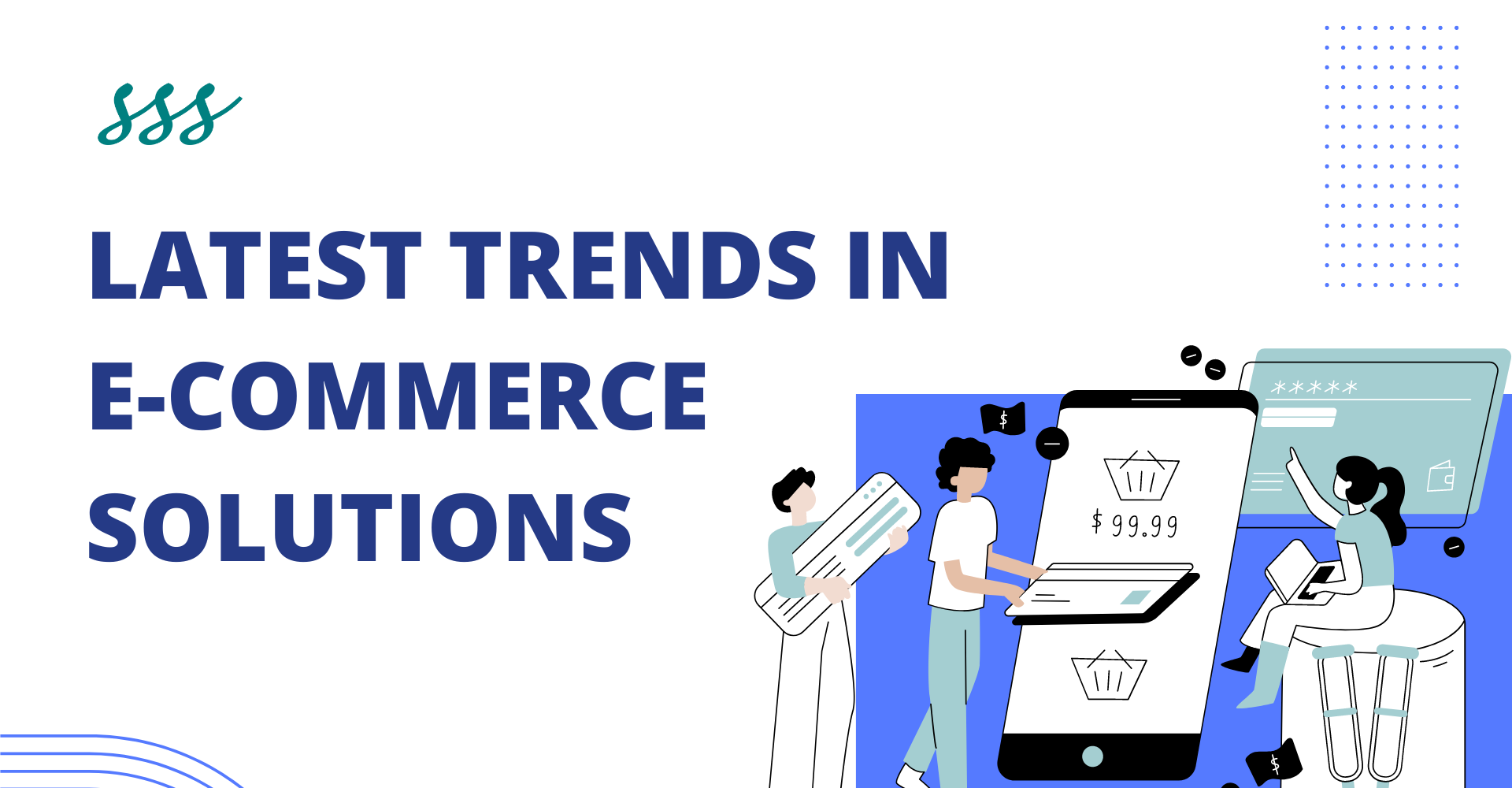
Unveiling the Latest Trends in E-commerce Solutions
Remember the days of flipping through endless catalogs and waiting weeks for your order to arrive? E-commerce has revolutionized shopping, making it faster, easier, and accessible from the comfort of your home. But the world of online stores is constantly evolving, offering new features and experiences that blur the lines between physical and digital shopping.
In this article, we’ll dive into the hottest e-commerce trends that are shaping the future of online shopping. We’ll explore how artificial intelligence (AI) is making recommendations that feel like they were read from your mind, how augmented reality (AR) is letting you try on clothes virtually, and how social media is turning your favorite influencers into your next shopping guides.
Whether you’re a seasoned online shopper or just starting to explore the vast e-commerce landscape, this article will unveil the exciting trends that are transforming the way we shop today. So, grab your favorite device, settle in, and get ready to discover the future of online retail!
Top 10 E-commerce Trends Shaping the Future of Online Shopping
The e-commerce landscape is a dynamic one, constantly evolving to meet the ever-changing needs and expectations of online shoppers. From cutting-edge technology to innovative ways to connect with customers, here are the top 10 trends that are redefining the online shopping experience:
1. Artificial Intelligence (AI) and Machine Learning (ML):
AI is no longer science fiction, it’s a driving force in e-commerce. AI algorithms analyze vast amounts of customer data, including browsing history, purchase behavior, and demographics.
Imagine a virtual shopping assistant suggesting items you’ll love before you even know you need them. AI tailors product suggestions to each shopper, increasing engagement and conversion rates. AI can adjust prices based on factors like demand, competitor pricing, and customer behavior, optimizing revenue and maximizing sales. These AI-powered tools provide 24/7 customer support, answer questions, and help navigate the shopping experience can improve search functionality, understand natural language queries, and suggest relevant products.
2. Augmented Reality (AR) Transforms Online Shopping
Augmented Reality (AR) technology is revolutionizing the way consumers shop online by allowing them to visualize products in their real-world environments before making a purchase. From trying on virtual clothing to placing virtual furniture in their homes, AR bridges the gap between online and offline shopping experiences, increasing consumer confidence and reducing returns. E-commerce platforms are increasingly integrating AR features into their websites and mobile apps, providing immersive shopping experiences that drive engagement and conversion rates.
3. Social Commerce Reinvents Online Retail
Social media platforms are becoming powerful marketplaces. This trend involves:
Shoppable posts: Buy products directly from within social media platforms like Instagram and TikTok. See influencers showcasing products and click to purchase with ease.
Live commerce: Brands host live shopping events on social media, interacting with viewers, answering questions, and promoting products in real time.
Social proof: Reviews, recommendations, and user-generated content on social media heavily influence buying decisions.
4. Subscription Models Enhance Customer Loyalty
Subscription Models have gained popularity in the e-commerce industry, offering consumers convenience and businesses recurring revenue streams. From meal kits and beauty boxes to streaming services and software subscriptions, the subscription model allows businesses to provide customers with a continuous stream of products or services for a fixed monthly fee. By fostering long-term relationships with customers and offering personalized experiences, subscription-based e-commerce businesses can enhance customer loyalty and drive sustainable growth.
5. Customer Support Becomes a Priority
In an increasingly competitive e-commerce landscape, providing exceptional Customer Support has become essential for businesses looking to stand out and build trust with their customers. From live chat and email support to social media monitoring and self-service portals, offering timely and personalized assistance can significantly impact the customer experience and drive repeat purchases. By investing in robust customer support infrastructure and leveraging technology such as AI-powered chatbots, businesses can resolve customer inquiries quickly and efficiently, leading to higher satisfaction rates and improved retention.
6. Customer Relationship Management (CRM) Drives Engagement
Effective Customer Relationship Management (CRM) is crucial for e-commerce businesses seeking to build meaningful connections with their customers and drive long-term engagement. By leveraging CRM software to collect, analyze, and utilize customer data, businesses can gain valuable insights into their customers’ preferences, behaviors, and purchase histories. This information enables targeted marketing campaigns, personalized communications, and loyalty programs tailored to individual customer needs, fostering deeper relationships and increasing lifetime customer value.
7. Chatbot Integration Enhances User Experience
Chatbot Integration has become increasingly prevalent in e-commerce websites and mobile apps, offering customers instant assistance and support around the clock. AI-powered chatbots can handle a wide range of inquiries, from product recommendations and order tracking to troubleshooting and FAQ responses, providing users with a seamless and efficient shopping experience. By integrating chatbots into their customer support infrastructure, e-commerce businesses can improve response times, reduce support costs, and enhance user satisfaction.
8. Headless Commerce Unlocks Flexibility
Headless Commerce architecture decouples the front-end presentation layer from the back-end e-commerce functionality, providing businesses with greater flexibility and agility in designing and delivering immersive shopping experiences across various digital touchpoints.
By separating the user interface from the underlying e-commerce platform, headless commerce enables faster innovation, easier customization, and seamless integration with third-party services and technologies. This flexibility allows businesses to adapt to changing market demands and deliver tailored experiences that resonate with their target audience.
9. Personalization Drives Conversion
Personalization has become a cornerstone of successful e-commerce strategies, allowing businesses to deliver relevant and engaging experiences that resonate with individual customers.
By leveraging customer data and AI algorithms, e-commerce platforms can tailor product recommendations, marketing messages, and user interfaces to match each user’s preferences, behaviors, and past interactions. Personalized experiences not only increase conversion rates and average order values but also foster brand loyalty and customer satisfaction, driving long-term success in the competitive e-commerce landscape.
10. More Ways to Pay Expand Accessibility
Offering More Ways to Pay has become increasingly important for e-commerce businesses seeking to accommodate diverse customer preferences and increase conversion rates. From traditional credit and debit cards to digital wallets, buy now, pay later options, and cryptocurrency, providing a variety of payment methods ensures that customers can complete transactions conveniently and securely.
By partnering with payment service providers and integrating multiple payment gateways, e-commerce businesses can remove friction from the checkout process and maximize revenue opportunities across global markets.
Conclusion:
The e-commerce landscape is ever-evolving, and staying ahead of the curve is crucial for success. Our comprehensive e-commerce solutions empower businesses to leverage the latest trends like AI, AR, and headless commerce. We help create personalized experiences, streamline customer journeys, and offer a wider range of payment options. Partner with us and unlock the full potential of your online store – let’s craft the future of e-commerce together!


